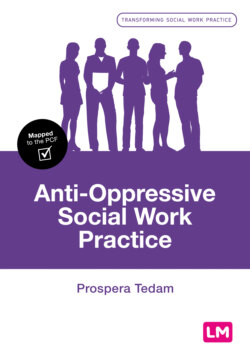Читать книгу Anti-Oppressive Social Work Practice - Prospera Tedam - Страница 14
На сайте Литреса книга снята с продажи.
Defining oppression
ОглавлениеLocating a universally agreed definition of oppression is no mean feat. However, as Dalrymple and Burke (2006) suggest, one main ingredient in oppression is power and power relations, and for this reason Chapter 3 in this book has been dedicated to the discussion of power and powerlessness. They suggest that oppression is an emotive and complex term, and that any attempt to define oppression in simple terms is to undermine this complexity.
Thompson (2001, p34) defines oppression as
inhuman or degrading treatment of individuals or groups; hardship and injustice brought about by the dominance of one group over another; the negative and demeaning exercise of power. Oppression often involves disregarding the rights of an individual or group and is thus a denial of citizenship.
No one is immune to oppression. However, it is important to note that individual characteristics and social identities can provide privilege or result in disadvantage, which puts them in the category of the oppressor or oppressed. Inhumane or degrading treatment is treatment that dehumanises people. Dominelli (2008) suggests that focusing on one aspect of oppression may be helpful to an individual at a particular point in time, but will not eradicate oppression completely or from groups of people.
In this chapter, I invite you to consider your own understanding of oppression arising from your experiences, observations and engagement with relevant theoretical information and knowledge of oppression. Oppression is nothing to be proud of, yet it is a real experience for many. It is the systematic and sustained abuse and misuse of power over others. Oppression can silence, but it can also be the vehicle for rebellion and emancipation.
Barker (2003, pp306–7) defines oppression as:
The social act of placing severe restrictions on an individual, group or institution. Typically, a government or political organization that is in power places these restrictions formally or covertly on oppressed groups so that they may be exploited and less able to compete with other social groups. The oppressed individual or group is devalued, exploited and deprived of privileges by the individual or group which has more power [my emphasis in bold type].
This definition by Barker is significant for many reasons and speaks to my own understanding and experiences of being oppressed. First, the ‘social act’ emphasises the fact that oppression comes to life through human social interactions. Everyone is at risk of being oppressed, devalued or exploited – individuals, groups and institutions – and this is done through covert hidden restrictions or via bold formal controls of those wielding more power.
A second definition of oppression is that by Charlton (1998, p8) which states that
oppression occurs when individuals are systematically subjected to political, economic, cultural, or social degradation because they belong to a social group . . . results from structures of domination and subordination and, correspondingly, ideologies of superiority and inferiority.
Ideologies of superiority and inferiority rely on the use of power to operationalise. There are many practice behaviours which result in people feeling inferior. For example, a situation where a family who are experiencing poverty and socioeconomic disadvantage are told they have too many children and should have considered their financial situation before having ‘all these children’, is one in which the social worker or professional is abusing their power.
I will continually refer to various portions of the definition by Barker (2003) as a way of drawing your attention to its application to practice.
